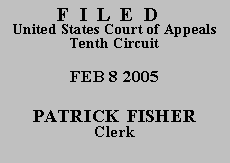

| GERALD M. McKINNON,
Plaintiff - Appellant,
v.
UNITED STATES BUREAU OF PRISONS,
Defendant - Appellee. |
No. 04-3362
(D.C. No. 04-CV-3279-RDR) |
§ 2241 petition seeking expungement of a particular disciplinary report from his record. We exercise jurisdiction pursuant to 28 U.S.C. § 1291 and AFFIRM.
While serving a sentence of eighteen years to life in federal prison, McKinnon was found guilty at an administrative disciplinary hearing of "interfering with a staff member (most like attempted assault)." The hearing officer imposed sanctions. However, all sanctions were suspended. McKinnon filed a § 2241 petition in district court seeking an order expunging the infraction from his record. He argued that insufficient evidence supported the infraction and therefore the Bureau of Prisons violated his due process rights.
In Sandin v. Conner, 515 U.S. 472, 486-87 (1995), the Court held that where a disciplinary action does not "work a major disruption in [a prisoner's] environment" or "inevitably affect the duration of his sentence," the prisoner has not suffered an atypical, significant hardship triggering due process protections. The court below concluded that having a disciplinary report in his record, even if the report were frivolous, does not subject McKinnon to atypical and significant hardship, and that therefore McKinnon failed to state a claim for relief under federal law.
McKinnon argues on appeal that the disciplinary report is "the sole matter that caused the denial of parole," and therefore "inevitably affect[s] the duration of his sentence." Sandin at 487.(1) To explain his position, McKinnon attaches to his brief a parole guideline worksheet. The worksheet shows that prior to receiving the disputed disciplinary report, McKinnon had a parole guideline range of 270-306 months; after factoring in the disciplinary report, McKinnon now has a guideline range of 270-308 months. Because the disciplinary report affects only the top of his guideline range while leaving the bottom undisturbed, we cannot conclude that it inevitably affects the duration of his sentence. Furthermore, the parole board's decision to grant parole at a given point in the 38-month range depends on a myriad of factors and "[t]he chance that a finding of misconduct will alter the balance is simply too attenuated to invoke the procedural guarantees of the Due Process Clause." Id. at 486. Additionally, McKinnon "is afforded procedural protection at his parole hearing in order to explain the circumstances behind his misconduct record." Id.
We therefore agree with the district court that McKinnon failed to state a claim meriting habeas relief and AFFIRM.
ENTERED FOR THE COURT
Carlos F. Lucero
Circuit Judge
*. The case is unanimously ordered submitted without oral argument pursuant to Fed. R. App. P. 34(a)(2) and 10th Cir. R. 34.1(G). This order and judgment is not binding precedent, except under the doctrines of law of the case, res judicata, and collateral estoppel. The court generally disfavors the citation of orders and judgments; nevertheless, an order and judgment may be cited under the terms and conditions of 10th Cir. R. 36.3.
1. McKinnon also argued below that the charge "interfering with a staff member (most like attempted assault)," is void for vagueness. He does not make any substantive void-for-vagueness argument on appeal, but does note that the offense "is vague and ambiguous." To the extent that McKinnon intends this statement to raise the void-for-vagueness issue, we agree with the district court's conclusion that the charge is not "so vague that men of common intelligence must necessarily guess at its meaning and differ as to its application." United States v. Protex Industries, Inc., 874 F.2d 740, 743 (10th Cir. 1989).